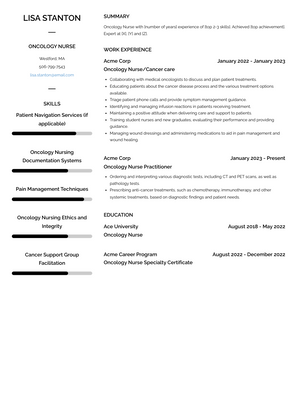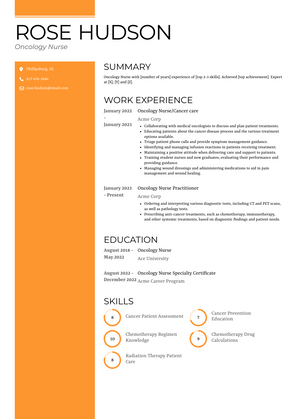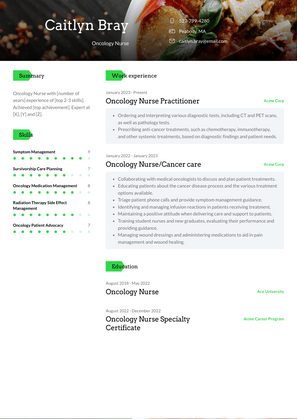3+ Oncology Nurse Resume Examples and Templates
This page provides you with Oncology Nurse resume samples to use to create your own resume with our easy-to-use resume builder. Below you'll find our how-to section that will guide you through each section of a Oncology Nurse resume.



What do Hiring Managers look for in an Oncology Nurse Resume
- Providing specialized nursing care to cancer patients, including those undergoing treatment, recovery, or palliative care.
- Administering chemotherapy, immunotherapy, and other cancer-related treatments.
- Monitoring and managing symptoms and side effects of cancer and its treatments.
- Educating patients and their families about cancer, treatment options, and symptom management.
- Collaborating with oncologists and healthcare teams to develop and implement patient care plans.
- Offering emotional support and counseling to patients and families dealing with the challenges of cancer.
- Keeping abreast of advances in oncology nursing and ensuring best practices in patient care.
How to Write an Oncology Nurse Resume?
To write a professional Oncology Nurse resume, follow these steps:
- Select the right Oncology Nurse resume template.
- Write a professional summary at the top explaining your Oncology Nurse’s experience and achievements.
- Follow the STAR method while writing your Oncology Nurse resume’s work experience. Show what you were responsible for and what you achieved as an Oncology Nurse.
- List your top Oncology Nurse skills in a separate skills section.
Advance your nursing career with a professionally written resume. Our nurse resume writing service highlights your clinical expertise, patient care skills, and healthcare accomplishments to help you secure your ideal nursing role.
How to Write Your Oncology Nurse Resume Header?
Write the perfect Oncology Nurse resume header by:
- Adding your full name at the top of the header.
- Add a photo to your resume if you are applying for jobs outside of the US. For applying to jobs within the US, avoid adding photo to your resume header.
- Add your current Oncology Nurse position to the header to show relevance.
- Add your current city, your phone number and a professional email address.
- Finally, add a link to your portfolio to the Oncology Nurse resume header. If there’s no portfolio link to add, consider adding a link to your LinkedIn profile instead.
Bad Oncology Nurse Resume Example - Header Section
Lillian 7600 W. Bay Meadows Avenue Rochester, NY 14606 Marital Status: Married, email: cooldude2022@gmail.com
Good Oncology Nurse Resume Example - Header Section
Lillian Flynn, Rochester, NY, Phone number: +1-555-555-5555, Link: linkedin/in/johndoe
Make sure to add a professional looking email address while writing your resume header. Let’s assume your name is John Doe - here is a formula you can use to create email addresses:
- firstnamelastname@email.com - johndoe@email.com
- firstname.lastname@email.com - john.doe@email.com
- lastname.firstname@email.com - doe.john@email.com
- f.lastname@email.com - j.doe@email.com
- l.firstname@email.com - d.john@email.com
- firstnamelastname12@email.com - johndoe12@email.com
For a Oncology Nurse email, we recommend you either go with a custom domain name (john@johndoe.com) or select a very reputed email provider (Gmail or Outlook).
How to Write a Professional Oncology Nurse Resume Summary?
Use this template to write the best Oncology Nurse resume summary: Oncology Nurse with [number of years] experience of [top 2-3 skills]. Achieved [top achievement]. Expert at [X], [Y] and [Z].
How to Write a Oncology Nurse Resume Experience Section?
Here’s how you can write a job winning Oncology Nurse resume experience section:
- Write your Oncology Nurse work experience in a reverse chronological order.
- Use bullets instead of paragraphs to explain your Oncology Nurse work experience.
- While describing your work experience focus on highlighting what you did and the impact you made (you can use numbers to describe your success as a Oncology Nurse).
- Use action verbs in your bullet points.
Oncology Nurse Practitioner Resume Example
Oncology Nurse Practitioner
- Ordering and interpreting various diagnostic tests, including CT and PET scans, as well as pathology tests.
- Prescribing anti-cancer treatments, such as chemotherapy, immunotherapy, and other systemic treatments, based on diagnostic findings and patient needs.
Oncology Nurse/Cancer care Resume Example
Oncology Nurse/Cancer care
- Collaborating with medical oncologists to discuss and plan patient treatments.
- Educating patients about the cancer disease process and the various treatment options available.
- Triage patient phone calls and provide symptom management guidance.
- Identifying and managing infusion reactions in patients receiving treatment.
- Maintaining a positive attitude when delivering care and support to patients.
- Training student nurses and new graduates, evaluating their performance and providing guidance.
- Managing wound dressings and administering medications to aid in pain management and wound healing.
Top Oncology Nurse Resume Skills for 2023
- Cancer Patient Assessment
- Chemotherapy Administration
- Radiation Therapy Patient Care
- Symptom Management
- Pain Management
- Oncology Medication Management
- Central Line Care and Maintenance
- Nutritional Support for Cancer Patients
- Palliative Care
- End-of-Life Care
- Cancer Treatment Side Effect Management
- Oncology Nursing Procedures (e.g., bone marrow biopsy)
- Blood Product Transfusion (if applicable)
- Port-A-Cath Access and Care
- Chemotherapy Drug Handling and Safety
- Infection Control Practices
- Cancer Patient Education and Counseling
- Clinical Trials Support
- Oncology Patient Assessment Tools
- Emotional Support for Cancer Patients
- Chemotherapy Drug Calculations
- Cancer Pain Assessment Tools
- Oncology Symptom Assessment
- Chemotherapy Regimen Knowledge
- Radiation Therapy Side Effect Management
- Radiation Safety Protocols
- Chemotherapy Toxicity Management
- Psychosocial Support for Cancer Patients
- Oncology Patient Family Support
- Cancer Survivorship Care
- Cancer Prevention Education
- End-of-Life Care Planning and Documentation
- Continuous Learning in Oncology Nursing
- Oncology Nursing Research
- Pain Management Techniques
- Palliative Care Documentation
- Chemotherapy Complications Management
- Oncology Nursing Ethics and Integrity
- Cancer Genetic Testing Education (if applicable)
- Oncology Patient Advocacy
- Multidisciplinary Team Collaboration
- Advanced Care Planning (if applicable)
- Survivorship Care Planning
- Patient Navigation Services (if applicable)
- Cancer Support Group Facilitation
- Oncology Nursing Documentation Systems
- Chemotherapy Assessment and Monitoring
- Pain Medication Administration
- Oncology Nursing Standards of Care
- Cultural Competence in Oncology Nursing
How Long Should my Oncology Nurse Resume be?
Your Oncology Nurse resume length should be less than one or two pages maximum. Unless you have more than 25 years of experience, any resume that’s more than two pages would appear to be too long and risk getting rejected.
On an average, for Oncology Nurse, we see most resumes have a length of 2. And, that’s why we advise you to keep the resume length appropriate to not get rejected.
Frequently Asked Questions (FAQs) for Oncology Nurse Resume
-
What does an Oncology Nurse do?
- An Oncology Nurse specializes in providing care to patients with cancer. They administer chemotherapy and other treatments, monitor patients for side effects, educate patients and their families about cancer diagnosis and treatment options, and provide emotional support throughout the treatment process.
-
What qualifications are important for an Oncology Nurse position?
- Qualifications typically include a bachelor's degree in nursing (BSN) or an associate degree in nursing (ADN) from an accredited nursing program. Additionally, oncology nursing certification (OCN) and experience in oncology nursing are often preferred. Strong clinical skills, empathy, and a commitment to patient advocacy are essential.
-
What kind of experience should an Oncology Nurse highlight on their resume?
- Experience in oncology nursing, including administering chemotherapy, managing symptoms, providing patient education, and collaborating with interdisciplinary teams, is crucial for an Oncology Nurse. Highlighting proficiency in oncology assessments, care planning, and patient advocacy can demonstrate relevant experience.
-
How important is it for an Oncology Nurse to demonstrate empathy and compassion on their resume?
- Empathy and compassion are vital qualities for an Oncology Nurse as they work closely with patients and families facing a cancer diagnosis. Highlighting experience in providing emotional support, addressing patients' concerns, and fostering a supportive environment can demonstrate these qualities.
-
Should an Oncology Nurse include their experience with symptom management on their resume?
- Yes, mentioning experience with symptom management techniques such as pain management, nausea control, and fatigue management is important for an Oncology Nurse. This demonstrates the Nurse's ability to address the complex physical and emotional symptoms associated with cancer and its treatments.
-
What soft skills are important for an Oncology Nurse to highlight on their resume?
- Soft skills such as communication, teamwork, empathy, resilience, and cultural competence are crucial for an Oncology Nurse. These skills contribute to effectively communicating with patients and families, collaborating with healthcare teams, and providing culturally sensitive care.
-
Is it necessary for an Oncology Nurse to mention their experience with chemotherapy administration on their resume?
- Yes, mentioning experience with chemotherapy administration, including proper handling, preparation, and administration techniques, is important for an Oncology Nurse. This demonstrates the Nurse's ability to safely administer complex treatments and monitor patients for potential side effects.
-
How should an Oncology Nurse tailor their resume for different care settings or patient populations?
- An Oncology Nurse should highlight experience and skills relevant to the specific care settings or patient populations they have worked with, whether it's inpatient oncology units, outpatient infusion centers, or hospice care. Emphasizing familiarity with specialized treatment protocols, patient education needs, and supportive care services can be beneficial.
-
Should an Oncology Nurse include their educational background on their resume?
- Yes, including educational background such as degrees, certifications, or relevant coursework related to oncology nursing or cancer care is important for an Oncology Nurse. This provides credibility and demonstrates the specialized training necessary for the role.
-
How can an Oncology Nurse make their resume visually appealing and easy to read?
- Utilizing clear headings, bullet points to highlight key skills and experiences, and a professional layout are important aspects of resume formatting. Additionally, including specific examples of successful patient outcomes, any relevant certifications or awards, or extracurricular involvement can enhance the overall presentation of the resume.
Copyright ©2025 Workstory Inc.
